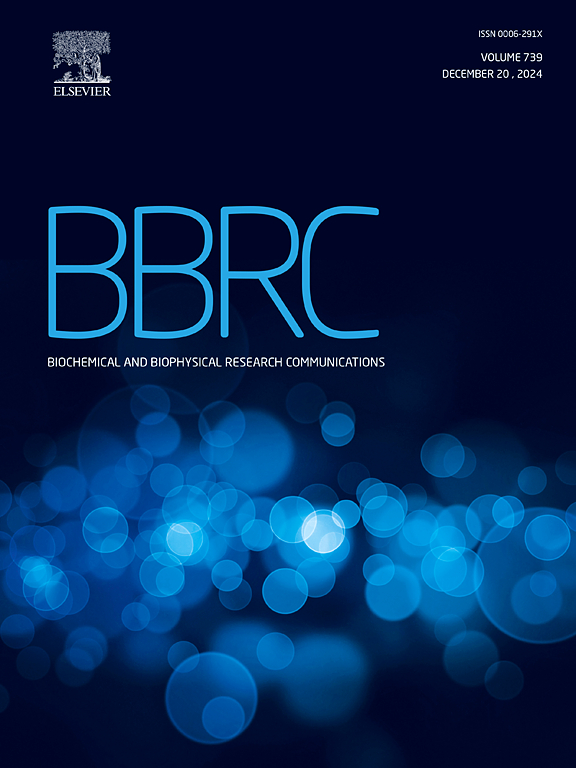AP1S3通过调节PI3K/AKT/mTOR通路影响乳腺癌细胞脂质代谢
IF 2.5
3区 生物学
Q3 BIOCHEMISTRY & MOLECULAR BIOLOGY
Biochemical and biophysical research communications
Pub Date : 2025-06-12
DOI:10.1016/j.bbrc.2025.152200
引用次数: 0
摘要
目的探讨适配蛋白复合物1 sigma 3 (adaptor protein complex 1 sigma 3, AP1S3)在乳腺癌(BRCA)进展中的作用,重点研究其对脂质代谢和PI3K/AKT/mTOR信号通路的调控作用。方法利用TCGA转录组数据库分析sap1s3在BRCA细胞中的表达水平,并通过GO和KEGG分析确定相关通路。通过CCK-8、菌落形成、伤口愈合和Transwell迁移试验检测AP1S3对BRCA细胞(MDA-MB-231和MDA-MB-436)增殖和迁移的影响。此外,通过测量脂滴积累、游离脂肪酸(FFA)水平和总胆固醇(TC)含量,评估AP1S3对BRCA细胞脂质代谢的调节作用。结果ap1s3在BRCA细胞中表达显著上调,与患者预后不良相关。功能研究表明,AP1S3敲低可显著抑制BRCA细胞的增殖和迁移。机制上,AP1S3通过激活PI3K/AKT/mTOR通路促进脂质代谢和肿瘤进展。AP1S3沉默导致脂质积累减少,脂质代谢相关基因下调。本研究强调了AP1S3通过调节脂质代谢和PI3K/AKT/mTOR通路在BRCA进展中的重要作用。这些发现表明,靶向AP1S3可能为治疗转移性BRCA提供新的见解和治疗途径。本文章由计算机程序翻译,如有差异,请以英文原文为准。
AP1S3 affects lipid metabolism in breast cancer cells by regulating the PI3K/AKT/mTOR pathway
Objective
This study aims to investigate the role of adaptor protein complex 1 sigma 3 (AP1S3) in breast cancer (BRCA) progression, focusing on its regulatory effects on lipid metabolism and the PI3K/AKT/mTOR signaling pathway.
Methods
AP1S3 expression levels in BRCA cells were analyzed using the TCGA transcriptome database, with associated pathways identified through GO and KEGG analyses. The effects of AP1S3 on BRCA cell (MDA-MB-231 and MDA-MB-436) proliferation and migration were detected using CCK-8, colony formation, wound healing, and Transwell migration assays. Additionally, the regulatory effect of AP1S3 on lipid metabolism in BRCA cells was evaluated by measuring lipid droplet accumulation, free fatty acid (FFA) levels and total cholesterol (TC) content.
Results
AP1S3 was significantly upregulated in BRCA cells and correlated with poor patient prognosis. Functional studies demonstrated that AP1S3 knockdown substantially inhibited BRCA cell proliferation and migration. Mechanistically, AP1S3 facilitated lipid metabolism and tumor progression by activating the PI3K/AKT/mTOR pathway. AP1S3 silencing resulted in decreased lipid accumulation and downregulation of lipid metabolism-related genes.
Conclusion
This study highlights the crucial involvement of AP1S3 in BRCA progression through its modulation of lipid metabolism and the PI3K/AKT/mTOR pathway. These findings suggest that targeting AP1S3 could provide novel insights and therapeutic avenues for treating metastatic BRCA.
求助全文
通过发布文献求助,成功后即可免费获取论文全文。
去求助
来源期刊
CiteScore
6.10
自引率
0.00%
发文量
1400
审稿时长
14 days
期刊介绍:
Biochemical and Biophysical Research Communications is the premier international journal devoted to the very rapid dissemination of timely and significant experimental results in diverse fields of biological research. The development of the "Breakthroughs and Views" section brings the minireview format to the journal, and issues often contain collections of special interest manuscripts. BBRC is published weekly (52 issues/year).Research Areas now include: Biochemistry; biophysics; cell biology; developmental biology; immunology
; molecular biology; neurobiology; plant biology and proteomics

 求助内容:
求助内容: 应助结果提醒方式:
应助结果提醒方式:


